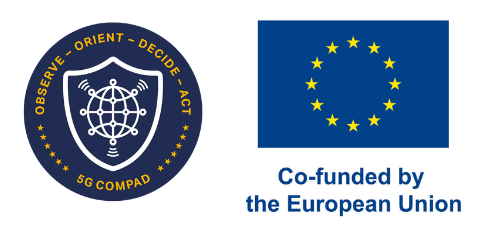A European defence industry project facilitating 5G use for defence, enabling interoperability of communications systems across Europe.
Challenge
European armed forces are in significant need of higher data bandwidth and lower latency connectivity. The currently used hardware-locked communication systems have limited data rates and interoperability, hindering defence-related collaboration across Europe. Enhancing communication systems with 5G technology is a crucial step towards ensuring information superiority and, hence, operational success, across the entire conflict spectrum, including peacetime, gray-zone, and full-armed conflicts.
Project aims and scope
By designing a reference architecture for a 5G-based communications system compatible with existing systems and platforms and by enabling the recurrent integration of 5G, the 5G COMPAD (5G Communications for Peacekeeping and Defence) project seeks to provide a robust high-speed communication system and enable the rapid introduction of new capabilities for the European armed forces. The project will also address the increased need for high-level cyber and information security.
Working on 5G COMPAD is a consortium of world-leading 5G technology companies and the strongest European defence system integrators and providers, network operators, research institutes, and technology SMEs from 11 EU member states and Norway.
The project consortium partners are Saab, Ericsson, Rheinmetall, Bittium, Nokia, Thales, Leonardo, Inster, Eight Bells, Intracom Defense (IDE), Cafa Tech, Telenor, Sintef, FFI (NO Gov), LMT, AIT, Synkzone, BHE, and APR Technologies, while the Sub-Contractors are CNIT, Fraunhofer FKIE, CEA and Space Hellas SA.
The consortium will work to develop the communication system architecture and specifications and will create joint testbeds to demonstrate the integration of 5G standalone networks with existing defence infrastructure using commercial and defence hardware and software components.
The project will take over 36 months, with the study and specification to take place in 2023, integration and extension in 2024, and validation in 2025.
LMT in 5G COMPAD
LMT is participating in 5G COMPAD as one of two network operators alongside the Norwegian Telenor and is one of the project’s consortium members. Within 5G COMPAD, LMT aims to apply this and the civil domain experience for 5G use cases, facilitate active engagement with military industry stakeholders to validate the best 5G use cases and determine suitable KPIs for these cases.
Within the scope of the project, LMT will lead the execution of several use case demonstrations. LMT will also share its integrator competencies, provide expertise in threat analysis of different 5G networks’ architectures and quantum technologies from the cyber security perspective, and identify defence ecosystem’s trends and potentials.
Moreover, LMT will be the leader of the 5G COMPAD dissemination activities.
The project is co-funded by the European Union under the European Defence Fund.
Project: 101103519 — 5G COMPAD — EDF-2021-C4ISR-D-2
Views and opinions expressed are however those of the author(s) only and do not necessarily reflect those of the European Union or the European Commission. Neither the European Union nor the granting authority can be held responsible for them.
